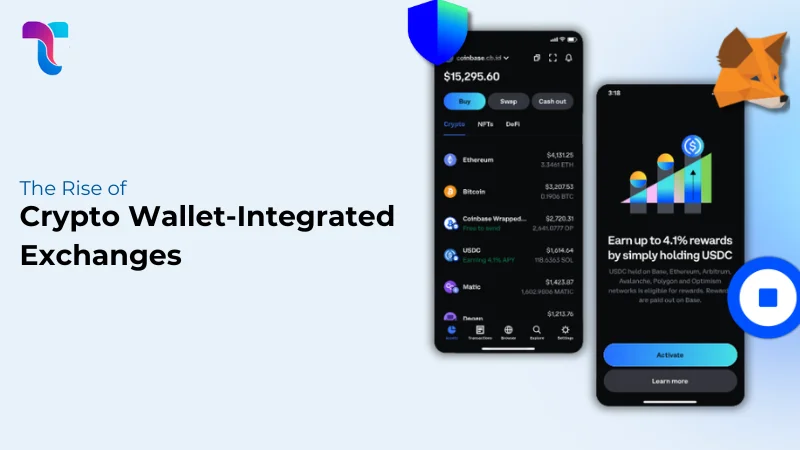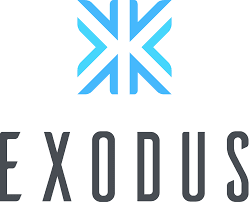Table of Contents
Let’s start this blog with an imagination!
You open your crypto wallet, and with just a few taps, you are swapping tokens, checking market prices, and staking assets – without switching apps.
Well, that’s what crypto wallet-integrated exchanges are. These offer the convenience of control, and your wallet comes with in-app crypto trading.
This shift isn’t just hype; it is backed by real momentum. In fact, global digital wallet users are projected to reach 5.2 billion by 2026, which accounts for over 60% of the world’s population. That means more people than ever are getting comfortable with wallet-integrated crypto exchanges.
Crypto wallets and exchanges are revolutionizing the way we interact with cryptocurrency by combining seamless trading and full asset control into one platform.
In this blog, we’ll talk about what these integrated crypto wallets and exchanges are, why they are gaining popularity, and more such things.
Let’s get started!
What Are Crypto Wallet Integrated Exchanges?
Crypto wallet-integrated exchanges are basically digital wallets that offer built-in trading features. It allows users to buy, sell, or swap cryptocurrencies directly within the wallet interface.
Traditionally, users had to transfer their assets to a centralized exchange or connect to one of the top decentralized crypto exchanges to perform trades. With wallet-integrated exchanges, that extra step is eliminated. Instead, the exchange functionality comes within the wallet itself.
This model combines the security of a non-custodial crypto wallet with the convenience of instant access to trading tools through crypto exchanges, which reduces the friction for users and makes crypto more accessible.
Why Are They Gaining Popularity?
There are several key reasons why businesses are looking to develop wallet-integrated exchanges, which are rapidly gaining popularity in the crypto space. Those include:
Full Ownership & Control
Wallet-integrated exchanges allow users to maintain complete control of their private keys and funds. Unlike centralized platforms that hold your assets, these wallets let you trade directly from your own address.
Convenience & Efficiency
Integrated exchanges eliminate the need to transfer assets between wallets and external trading platforms. Users can manage their portfolio, make trades, and explore DeFi tools – all from one app.
Improved Security
By keeping funds in self-custodial wallets and executing trades on-chain, users can avoid the security risks of centralized exchanges, such as hacks, lockouts, or frozen accounts.
Access to Decentralized Finance (DeFi)
Many wallet-integrated exchanges provide direct access to blockchain ecosystem protocols such as DEXs, staking platforms, and liquidity pools. This allows users to earn yields, provide liquidity, or explore new projects.
Mobile-First Adoption
With billions of people using mobile wallets globally, integrated exchanges are designed to support fast and intuitive crypto trading on mobile devices. This makes it easier for both beginners and pros to manage and trade crypto.
Growing Ecosystem Support
Some of the best crypto wallets, like MetaMask, TrustWallet, and Coinbase, are actively boosting their in-app trading features. As these tools become more advanced and user-friendly, more people are turning to wallet-integrated platforms as their primary way to trade.
Key Features of Crypto Wallet-Exchange Integration
The integration of exchange functionalities into crypto wallets is a powerful upgrade. Now, let’s look at the core features that define this integration:
In-App Token Swapping
Users can instantly swap one cryptocurrency for another within the wallet interface. The wallet connects to decentralized exchanges, which provide real-time prices, without needing to move assets to an external platform.
On-Chain Transactions
All trades are executed directly on the blockchain. This ensures transparency, security, and verifiability. Unlike centralized exchanges, there is no need to deposit funds into a third-party account.
Access to Liquidity Aggregators
Many wallets integrate with liquidity aggregators like 1inch or Matcha, which pull the best rates from multiple decentralized exchanges. This helps users get the most competitive pricing for their trades.
Portfolio Tracking
Integrated wallets often include features that allow users to track their portfolio value in real time. This includes asset breakdowns, price charts, and historical performance, which helps users make informed decisions.
Cross-Chain Functionality
Advanced wallet integrations support cross-chain trading via bridges or multi-chain protocols. This allows users to trade tokens across different blockchains without manually bridging assets through multiple steps.
User-Centric Interface
These wallets prioritize user experience with intuitive design, easy navigation, and simplified transaction flows. This makes crypto trading and asset management easier.
Security & Privacy Controls
Integrated wallets emphasize security with features like end-to-end encryption, hardware wallet support, biometric authentication, and transaction approvals. This minimizes the risk of account compromise.
Examples of Wallet-Integrated Exchanges in 2025
Now, we’ll take a detailed look at the best crypto wallet options with exchange and consider each product’s pros and cons:
MetaMask with Swaps
MetaMask is a widely used non-custodial and decentralized wallet with a swap feature, which aggregates prices from multiple DEXs. Users can compare rates and execute trades without leaving the wallet, which makes it a perfect choice for DeFi users seeking control and convenience.
Key Benefits:
- Access to multiple DEXs (Uniswap, 1inch, Paraswap, etc.)
- Transparent price comparison before swapping
- Full control over private keys and funds
- Available as a browser extension and mobile app
Trust Wallet
Trust Wallet offers integrated token swaps through DEXs and connects directly with Binance for buying and selling crypto. It supports thousands of tokens, staking, and even NFTs, which provides a well-rounded and mobile-first experience for self-custodial users.
Key Benefits:
- Built-in DEX swaps and Binance integration
- Staking support for multiple tokens
- NFT and multi-chain asset support
- Simple, mobile-friendly interface
Coinbase Wallet
Coinbase Wallet bridges the centralized and decentralized worlds by allowing users to access both in-wallet swaps (via DEXs) and connect to the Coinbase exchange. It is great for users who want the security of self-custody but still need fiat on/off ramps.
Key Benefits:
- Seamless link to Coinbase exchange
- In-app DEX swaps via aggregators
- Support for DeFi apps and NFTs
- Regulated brand recognition with DeFi access
Exodus Wallet
Exodus is a user-friendly wallet available on desktop and mobile, which offers built-in crypto swaps through third-party providers. Its clean interface and integrated portfolio tracking make it ideal for those who want an all-in-one solution without getting into too many complexities with DeFi.
Key Benefits:
- Integrated exchange with no account setup
- Real-time portfolio tracking and analytics
- Multi-asset support (100+ cryptocurrencies)
- Available across desktop, mobile, and hardware integration
Revolut (FinTech Super App)
Revolut isn’t a traditional crypto wallet but functions as a fintech app with integrated crypto exchange features. Widely known as a crypto super app, it allows users to buy, sell, and hold crypto alongside fiat. It is perfect for newbies exploring digital assets in a familiar interface.
Key Benefits:
- Combines fiat and crypto in one app
- Easy onboarding for beginners
- Supports recurring purchases and price alerts
- Backed by a licensed financial institution
The Future of Crypto Wallet Integrated Exchanges
The rise of wallet-integrated exchanges is just the beginning. We can expect these all-in-one platforms to become even more powerful, user-centric, and essential to the crypto experience.
Here’s what the future may look like:
AI-Powered Trading Tools
Wallets will likely integrate tools like AI-powered crypto trading bots that help users make better trading decisions. These even offer real-time insights, risk analysis, and personalized portfolio recommendations, all within the app.
Cross-Chain Swaps
With a growing adoption of multi-chain ecosystems, users will soon be able to swap assets across different blockchains without the need for complicated steps. One tap, and you are done.
Deeper DeFi & NFT Integration
You can expect tighter integration with DeFi protocols, NFT marketplaces, and even tokenized real-world assets. Your wallet could become a full financial dashboard, handling loans, yield farming, and NFT management, all in one place.
Enhanced UX for Mass Adoption
To onboard the next billion users, crypto wallets will need to focus on user-friendly design, fiat ramps, and educational tools. This bridges the gap between Web2 and Web3 for the everyday users.
Wrapping Up
That’s a wrap for this blog!
Now, it’s clear – the way we interact with crypto is changing fast. Wallet-integrated exchanges are now becoming a go-to platform for users to trade, swap, and stake directly from their wallets.
With several options available for crypto exchange apps that include wallets, you can easily participate in this revolution. And be it you are building a DeFi project or launching your own crypto wallet, this is the future to watch.
And if you’re ready to be part of that future, Technoloader can help. Get in touch with us!
FAQs
How is a crypto wallet-integrated exchange different from a normal exchange?
Traditional exchanges require users to deposit funds into their platform to trade. On the other hand, wallet-integrated exchanges let you trade directly from your own wallet, which gives you full control over your private keys and funds at all times.
Are wallet-integrated exchanges safe?
Yes, they are generally considered safe, especially because they are non-custodial. This means you control your private keys and your funds never leave your wallet unless you approve a transaction.
Can I buy crypto with fiat directly in these wallets?
Many wallet-integrated exchanges now support fiat on-ramps, which allow users to buy crypto using credit/debit cards, bank transfers, or third-party services. Some of the popular fiat on/off ramp crypto wallets are Trust Wallet, MetaMask, and Coinbase Wallet.
Do I need KYC for wallet-integrated exchanges?
In most cases, no! Wallet-integrated exchanges that rely on decentralized protocols typically do not require KYC. However, if you are using fiat on-ramps or linking to centralized exchanges, KYC may be required depending on local regulations.
Are these exchanges suitable for beginners?
Absolutely! Many wallet-integrated exchanges are designed with simplicity in mind and even offer clean interfaces, guided swaps, and in-app support. They are especially helpful for beginners who want to explore crypto without managing multiple platforms or sacrificing control over their assets.
 +91 7014607737
+91 7014607737
 info@technoloader.com
info@technoloader.com








